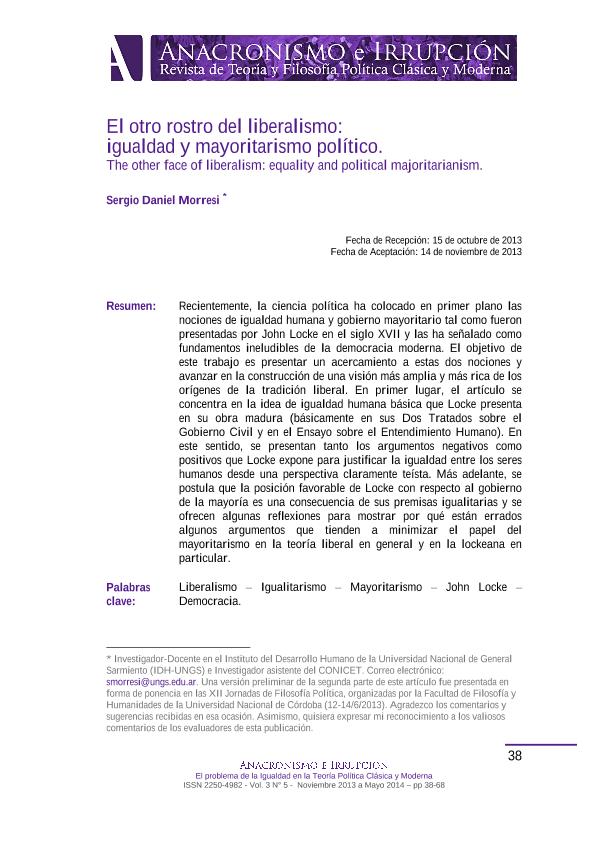Mostrar el registro sencillo del ítem
dc.contributor.author
Morresi, Sergio Daniel

dc.date.available
2019-12-04T21:07:43Z
dc.date.issued
2013-11
dc.identifier.citation
Morresi, Sergio Daniel; El otro rostro del liberalismo: igualdad y mayoritarismo político; Universidad de Buenos Aires. Facultad de Ciencias Sociales; Anacronismo e Irrupción; 3; 5; 11-2013; 38-68
dc.identifier.issn
2250-4982
dc.identifier.uri
http://hdl.handle.net/11336/91431
dc.description.abstract
Recientemente, la ciencia política ha colocado en primer plano las nociones de igualdad humana y gobierno mayoritario tal como fueron presentadas por John Locke en el siglo XVII y las ha señalado como fundamentos ineludibles de la democracia moderna. El objetivo de este trabajo es presentar un acercamiento a estas dos nociones y avanzar en la construcción de una visión más amplia y más rica de los orígenes de la tradición liberal. En primer lugar, el artículo se concentra en la idea de igualdad humana básica que Locke presenta en su obra madura (básicamente en sus "Dos Tratados sobre el Gobierno Civil" y en el "Ensayo sobre el Entendimiento Humano"). En este sentido, se presentan tanto los argumentos negativos como positivos que Locke expone para justificar la igualdad entre los seres humanos desde una perspectiva claramente teísta. Más adelante, se postula que la posición favorable de Locke con respecto al gobierno de la mayoría es una consecuencia de sus premisas igualitarias y se ofrecen algunas reflexiones para mostrar por qué están errados algunos argumentos que tienden a minimizar el papel del mayoritarismo en la teoría liberal en general y en la visión lockeana en particular. -
dc.description.abstract
Recently, Political Science has placed the notions of human equality and majority rule in the foreground in the same way that they were presented by John Locke in the seventeenth century and has designated them as important foundations of modern democracy. The aim of this work is to present an approach to these two notions and advance in the construction of a broader and richer perspective on the origins of the liberal tradition. Firstly, the article focuses on the idea of basic human equality that Locke presents in his mature work (basically in his Two Treatises of Civil Government and in his Essay concerning Human Understanding). Both, positive and negative arguments advanced by Locke to justify the equality of human beings from a clearly theistic perspective are presented. Later, it is postulated that Locke’s defense of majority rule is a consequence of his egalitarian premises. Finally, some reflections are offered to show why some arguments that tend to minimize the role of majoritarianism in the liberal theory in general and in the Lockean perspective in particular are wrong.
dc.format
application/pdf
dc.language.iso
spa
dc.publisher
Universidad de Buenos Aires. Facultad de Ciencias Sociales

dc.rights
info:eu-repo/semantics/openAccess
dc.rights.uri
https://creativecommons.org/licenses/by-nc-sa/2.5/ar/
dc.subject
LIBERALISMO
dc.subject
IGUALITARISMO
dc.subject
MAYORITARISMO
dc.subject
DEMOCRACIA
dc.subject.classification
Ciencia Política

dc.subject.classification
Ciencia Política

dc.subject.classification
CIENCIAS SOCIALES

dc.title
El otro rostro del liberalismo: igualdad y mayoritarismo político
dc.title
The other face of liberalism: equality and political majoritarianism
dc.type
info:eu-repo/semantics/article
dc.type
info:ar-repo/semantics/artículo
dc.type
info:eu-repo/semantics/publishedVersion
dc.date.updated
2019-10-21T13:35:55Z
dc.journal.volume
3
dc.journal.number
5
dc.journal.pagination
38-68
dc.journal.pais
Argentina

dc.journal.ciudad
Ciudad Autónoma de Buenos Aires
dc.description.fil
Fil: Morresi, Sergio Daniel. Consejo Nacional de Investigaciones Científicas y Técnicas; Argentina. Universidad Nacional de General Sarmiento. Instituto del Desarrollo Humano; Argentina
dc.journal.title
Anacronismo e Irrupción
dc.relation.alternativeid
info:eu-repo/semantics/altIdentifier/url/https://publicaciones.sociales.uba.ar/index.php/anacronismo/article/view/1050
Archivos asociados
